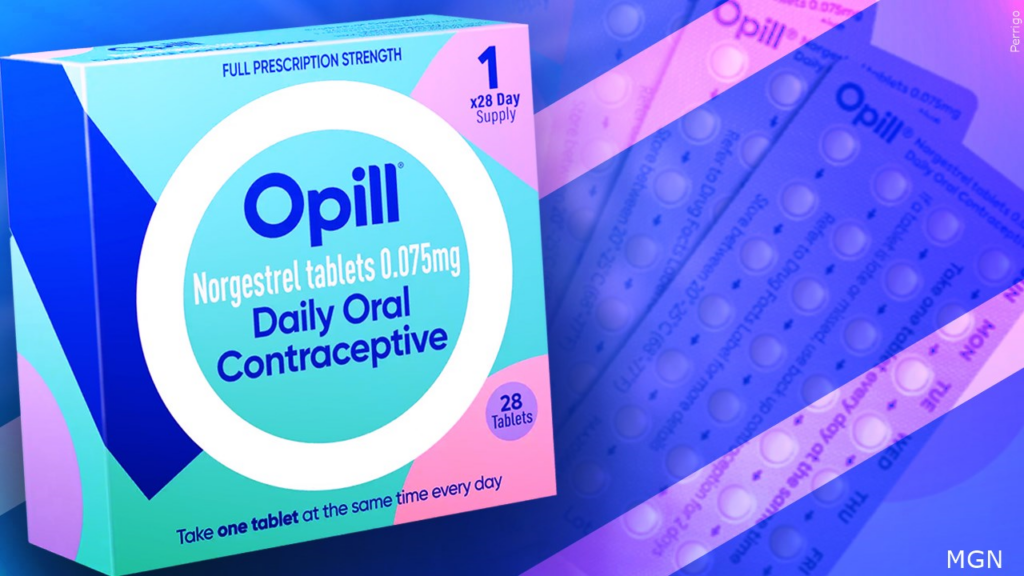The Post-Roe Shift: Exploring The Implications Of Over-the-Counter Birth Control

Table of Contents
Increased Accessibility and its Impact on Reproductive Health
Making birth control readily available over-the-counter (OTC) could revolutionize reproductive healthcare access, particularly for underserved populations.
Improved Access for Underserved Populations
Currently, significant disparities exist in access to birth control. Many women in rural areas, low-income communities, and those lacking reliable healthcare access face substantial barriers. OTC birth control could significantly alleviate these challenges:
- Reduced financial barriers: The cost of prescription birth control, including doctor visits and medication, can be prohibitive for many. OTC options could reduce these financial hurdles, making contraception more accessible.
- Easier access for those facing transportation challenges: Geographic location significantly impacts access to healthcare. OTC availability eliminates the need to travel to a clinic or doctor's office for a prescription.
- Potential for improved health outcomes due to consistent contraception: Improved access to birth control translates to increased consistent use, leading to lower rates of unintended pregnancies and improved overall reproductive health. A 2020 study by the Guttmacher Institute showed that lack of access to contraception is a major factor contributing to unintended pregnancies among low-income women.
Empowering Women to Take Control of Their Reproductive Health
Access to OTC birth control empowers women to take control of their reproductive health and family planning decisions.
- Increased self-sufficiency: The ability to obtain birth control without needing a doctor's appointment fosters greater autonomy and self-reliance.
- Reduced reliance on healthcare providers for contraception: This reduces the burden on already strained healthcare systems, allowing providers to focus on more complex reproductive health needs.
- Potential for better adherence to birth control regimens: Easier access may lead to improved adherence to prescribed regimens, ultimately resulting in more effective contraception. This, in turn, can contribute to a reduction in unintended pregnancies.
Potential Challenges and Concerns
While increased access to over-the-counter birth control offers significant advantages, several challenges and concerns warrant careful consideration.
Misinformation and Incorrect Usage
The absence of mandatory physician consultation raises concerns about potential misuse and lack of proper guidance.
- The importance of comprehensive education and readily available resources: Extensive public health campaigns and easily accessible online resources are critical to ensure women understand how to use birth control correctly and safely.
- Potential for increased unintended pregnancies due to incorrect usage: Without proper guidance, incorrect usage could lead to decreased effectiveness, increasing the risk of unintended pregnancies.
- The role of pharmacies in providing information: Pharmacists must play a crucial role in providing accurate information, answering questions, and potentially screening for contraindications. Enhanced training is essential. Studies have shown that pharmacist counseling can significantly improve patient understanding and adherence to medication regimens.
Cost and Affordability
Even with OTC availability, the cost of birth control remains a concern. Will it truly be affordable for all?
- Potential for increased cost without insurance: The price of OTC birth control may be higher than with insurance coverage, potentially excluding those without insurance or sufficient financial resources.
- The role of government subsidies and affordable care acts: Government subsidies and programs like the Affordable Care Act (ACA) play a critical role in ensuring affordability. Maintaining and expanding these programs is essential.
- Comparison of costs with prescription birth control: A thorough cost comparison between prescription and OTC birth control is necessary to evaluate the actual affordability for various populations. Data on current birth control costs and potential price fluctuations are crucial for policy decisions.
Impact on Public Health Infrastructure
Increased demand for OTC birth control could strain existing public health infrastructure and resources.
- Need for increased funding for public health initiatives: More funding is needed for public health education campaigns to address misinformation and promote safe contraceptive practices.
- Potential strain on emergency rooms due to complications: Although rare, complications from birth control use may increase, potentially straining emergency room resources.
- Increased demand for sexual health education programs: Enhanced sex education in schools and community settings is crucial to ensure informed decision-making regarding contraception.
The Role of Pharmacists and Healthcare Professionals
Pharmacists and healthcare professionals have critical roles to play in ensuring the safe and effective transition to more widely available over-the-counter birth control.
Expanding Pharmacist Training and Education
Pharmacists will be on the frontlines of providing information and counseling. Therefore, comprehensive training is essential.
- Importance of comprehensive training programs: Pharmacists need extensive training on various birth control methods, potential side effects, contraindications, and patient counseling techniques.
- The role of pharmacists in answering patient questions: Pharmacists should be equipped to address patient concerns and provide accurate information in a clear and understandable manner.
- Importance of accurate and up-to-date information: Ongoing professional development is essential to ensure pharmacists have access to the latest research and guidelines on birth control.
Continued Access to Comprehensive Reproductive Healthcare
While OTC birth control expands access, it doesn't replace the need for comprehensive reproductive healthcare.
- Importance of regular checkups and screenings: Regular visits to healthcare providers are vital for overall reproductive health, including detecting and managing potential health issues.
- Importance of seeking professional medical advice: Women should seek professional advice for complex reproductive health issues that require medical intervention.
- The role of doctors in diagnosing and treating underlying health issues: Physicians are essential in diagnosing and treating underlying health conditions that could affect birth control choices and effectiveness.
Conclusion
The debate surrounding over-the-counter birth control is multifaceted, presenting both significant opportunities and potential challenges. While increased access holds the promise of improved reproductive health outcomes, particularly for underserved populations, addressing the risks associated with misinformation and improper usage is crucial. Effective public health campaigns, extensive pharmacist training, and continued access to comprehensive reproductive healthcare services are vital for a successful transition. To learn more about this complex issue and how to access reliable information on birth control, explore resources using keywords such as "over-the-counter birth control options," "safe birth control practices," and "access to reproductive healthcare." The future of reproductive healthcare depends on a careful and informed approach to over-the-counter birth control and its impact on individuals and communities.

Featured Posts
-
 Bundesliga Legends The Impact Of Italian Players Like Grifo Immobile And Toni
Apr 29, 2025
Bundesliga Legends The Impact Of Italian Players Like Grifo Immobile And Toni
Apr 29, 2025 -
 The Best Italian Players To Grace The Bundesliga A Look At Their Careers
Apr 29, 2025
The Best Italian Players To Grace The Bundesliga A Look At Their Careers
Apr 29, 2025 -
 New Huawei Ai Chip A Direct Competitor To Nvidia
Apr 29, 2025
New Huawei Ai Chip A Direct Competitor To Nvidia
Apr 29, 2025 -
 Tragedy Strikes Georgia Deputy Killed Colleague Injured In Traffic Stop
Apr 29, 2025
Tragedy Strikes Georgia Deputy Killed Colleague Injured In Traffic Stop
Apr 29, 2025 -
 Middle Management A Vital Link In Organizational Effectiveness And Employee Development
Apr 29, 2025
Middle Management A Vital Link In Organizational Effectiveness And Employee Development
Apr 29, 2025
